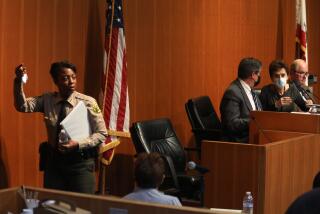Editorial: D.A. takes right step in reviewing cases
Even if the Board of Supervisors had rejected Dist. Atty. Jackie Lacey’s request for funding to establish a unit to review the integrity of questionable criminal convictions, Lacey would have done the county a service in merely acknowledging the possibility that her office may, on occasion, charge defendants with crimes they didn’t commit, take them to trial and win convictions.
So many prosecutors around the nation have, for so long, rejected the notion that there could be anything amiss in their work, and so many have resisted any attempt to reopen proceedings when new evidence comes to light that could undermine a hard-won conviction, that Lacey’s call for a Conviction Review Unit is by itself a big deal. She is the prosecutor of the nation’s most populous county — the one that files more cases and obtains more convictions than any other — so her example surely won’t go unnoticed.
So thanks are due to Lacey for making the request.
But the board, to its credit, did in fact allocate the funding, and Lacey’s unit now joins a handful of similar teams around the nation, beginning with Dallas County, Texas, and now including prosecutors’ offices in Manhattan and Brooklyn, N.Y., and Santa Clara, Yolo and San Diego counties.
As the unit begins its work, it’s worth noting some variations among those offices and the standards of review they employ.
In Dallas County, for example, prosecutors look not only for factual innocence but also extreme flaws in the process. If testimony was clearly fabricated or evidence was faked or mishandled, the district attorney might petition the court for review — even if prosecutors were not certain that the error or misconduct directly affected the guilty verdict. The district attorney’s focus has been, as it should be, on the integrity of the process as well as the crime.
Other district attorneys proceed only if they believe a guilty party is innocent. That’s far better than no formal review at all, but it falls short of the prosecutor’s duty to ensure that proceedings are constitutional. Lacey’s office should aim for the more exacting standard.
Lacey also ought to consider cases in which the defendant, instead of being convicted after a trial, pleaded guilty but later insisted he was innocent. It’s hardly news that innocent people sometimes plead guilty, often because they are counseled to accept a plea bargain to avoid a more severe sentence. If bad evidence or bad advice cornered the defendant into that plea, the people should be able to expect that their representative — the prosecutor — will rectify the situation.
Follow the Opinion section on Twitter @latimesopinion and Facebook
More to Read
A cure for the common opinion
Get thought-provoking perspectives with our weekly newsletter.
You may occasionally receive promotional content from the Los Angeles Times.






